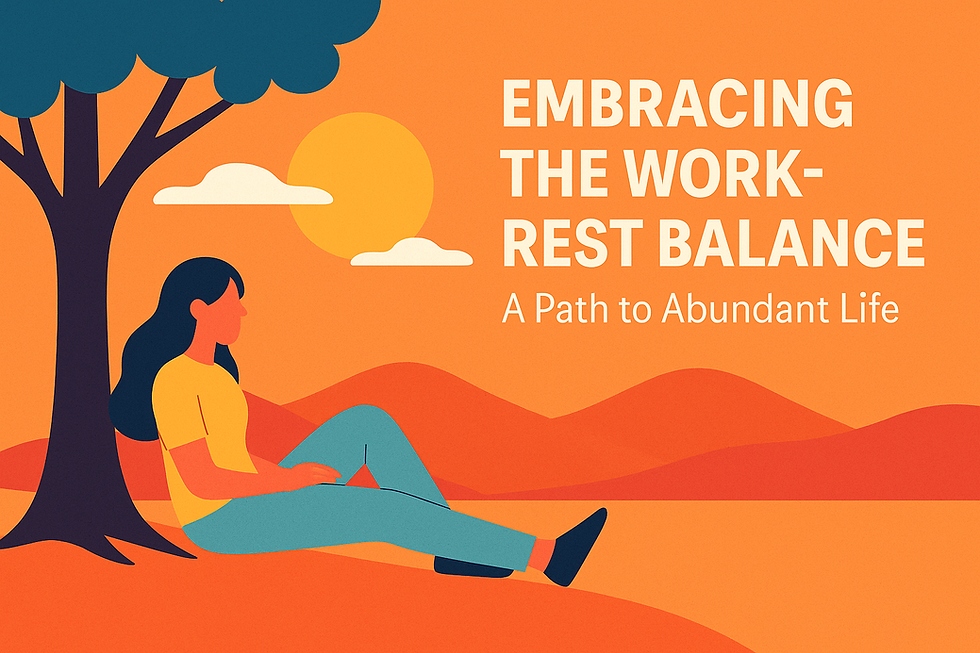Our God Works, The Leisure Gospel is a Lie
- Dave Miller

- 5 hours ago
- 4 min read
By Dave Miller

In the modern Western world, leisure has increasingly become the finish line of life. We’re taught to work hard so that one day we can rest easy. But Scripture presents a radically different perspective: one in which work is not merely a means to an end—but a reflection of the very nature of God.
This isn’t about hustle culture or never taking a Sabbath. It’s about realigning our theology of work to match the God who “never stops working” (John 5:17).
God Is Not Passive—So Why Should We Be?
At the core of the biblical worldview is this: God actively works in His creation. Genesis tells us, “In the beginning God created…” (Genesis 1:1). But the narrative doesn’t stop with creation. God continues to uphold, redeem, and govern the universe. “He existed before anything else, and he holds all creation together” (Colossians 1:17, NLT).
Even God isn’t passive in His creation once his work was completed and a day of rest was taken. The implication? If we are made in His image (Genesis 1:27), we are made to work as He works—not as a burden, but as a means of glorifying Him and blessing others.
The Anti-Biblical Pursuit of Leisure
If leisure and getting away from work is my primary objective, fundamentally, I’m no longer rooted in the biblical worldview.
This is not merely a lifestyle critique—it’s a theological rebuke. To orient one’s life around comfort, relaxation, and self-indulgence is to embrace a trajectory that is not even in the wheelhouse of the way in which the Scriptures teach life should be. Leisure as purpose will always lead to decay. It is the road to destruction.
That’s because when the purpose of work is to escape work, we’ve lost sight of the why behind human activity. And worse—this posture slowly leads us away from the life God designed.
Work Is a Blessing, Not a Curse
After the Fall, work became toilsome (Genesis 3:17-19), but work was never a curse in itself. Adam was tasked with tending the garden before sin entered the world (Genesis 2:15). This shows us that work is not punishment—it is purpose.
If men don’t have work, they lose purpose. And work, again, is not a means to an end. Work is an end in itself. Work itself is purposeful because it is the way that I contribute to my fellow man.
This echoes Paul’s stern but loving words to the Thessalonians: “Even while we were with you, we gave you this command: ‘Those unwilling to work will not get to eat’” (2 Thessalonians 3:10, NLT). That’s not a harsh political slogan—it’s a spiritual truth. Work and provision go hand-in-hand under God’s design.
Faith, Economy, and Abundance
When we work, we’re not just surviving—we’re participating in God’s economy of abundance. God’s equation is not a zero-sum game. There is no ‘if I give, I lose.’ With God, there is always more to receive.there is always grace upon grace to provide for His work in our work.
In fact, Scripture teaches this as a promise: “Give, and you will receive. Your gift will return to you in full—pressed down, shaken together to make room for more, running over…” (Luke 6:38, NLT).
Work isn’t a threat to joy—it’s the soil in which joy and generosity take root.
The Real Purpose of Work: To Bless Others
The heart of the matter is this: If you’re using people to get what you want instead of using what you do to bless people, then you’re anti-kingdom.
That’s a bold statement, but it’s precisely the kind of clarity the Church needs in today’s cultural moment. We were created to contribute—to produce, to provide, to serve.
In Ephesians 4:28, Paul writes, “If you are a thief, quit stealing. Instead, use your hands for good hard work, and then give generously to others in need” (NLT). Why do we work? So we can give.
The end goal of work is not self. It’s service. It’s stewardship. Ask yourself, “I’m I working to give or escape?”
Final Word: Leadership, Responsibility, and the Image of God
If God is both sovereign and good, then His expectation for leaders (and indeed for all people) is clear: to exercise responsibility in the spheres we’ve been given.
If God created the world then who has ultimate responsibility for that? If God created, He has ultimate responsibility. What he expects is leaders who, when delegated authority, are good, as He is good, in how they steward it.
Work is how we steward our corner of creation.
It’s how we lead—even if we don’t have a title. It is the way we own our delegated dominion to spread the glory of God in and through His creation with the goodness of its Creator as blessing to the people of His creation as witness and invitation to the redeemed perfection in Jesus made reality in the new heavens and new earth. When we abandon work, we abandon responsibility. And when we abandon responsibility, we lose dignity, purpose, and even joy. When we abandon work, we lose the fullness of our humanity God intends and redeems through King Jesus and His Kingdom.
Let’s Reject the Leisure Gospel. Embrace the God Who Works.
Jesus did not come so we could retire early and coast through life. He came so we could live abundantly through faith in Him: the work he accomplished before his crucifixion (John 17:4) and after (John 19:30)—and that includes investing our time, skills, and effort in things that matter.
So work hard—not to escape, but to engage. Not to consume, but to contribute. And in doing so, reflect the active, generous God in whose image you were made.
“Work willingly at whatever you do, as though you were working for the Lord rather than for people.”
—Colossians 3:23, NLT





Comentarios